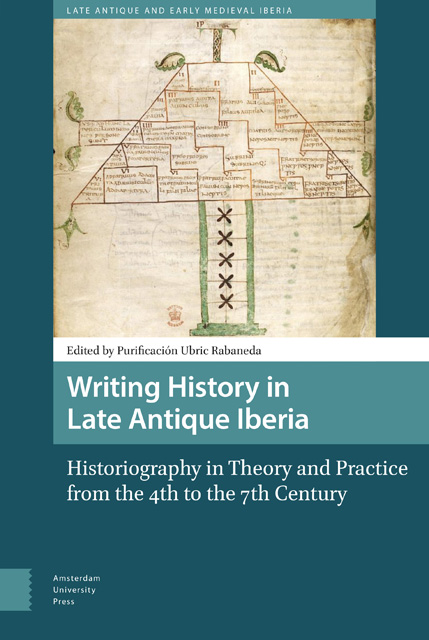 Writing History in Late Antique Iberia
Writing History in Late Antique Iberia Published online by Cambridge University Press: 18 April 2023
Abstract
This chapter analyses the historical conception, which presents a strong apocalyptical connotation, of the Chronicle of Hydatius of Lemica. Eyewitness to the historical events of his time, Hydatius asserts that the end of the empire (finis imperii ), perceived as imminent, coincides with the end of times (finis temporum ) and the advent of Judgement Day, as the massive presence of prophecies and omens of the break-up of the Roman empire denotes. Particular attention will also be paid to the analysis of the quote of the apocryphal Apocalypse of Thomas, which influenced the catastrophic eschatology of Hydatius and his interpretation of the coeval historical course.
Keywords: Hydatius, Chronicle, Iberian peninsula, Latin Historiography, Late Antiquity
In the unsettled socio-political and literary spheres of Late Antiquity, the Chronicle of Hydatius represents reliable and important evidence for the reconstruction of the political and military events that occurred in the Iberian peninsula during the fifth century. The Bishop of Aquae Flaviae (present-day Chaves in Portugal) pursues the previous historiographical works of the ‘holy and very erudite Fathers’ (patres sancti et eruditissimi ), Eusebius of Caesarea and Jerome, and traces a chronological period that goes from 379 to 468: with a dark stylistic expressionism and a marked pessimistic vein, he makes a detailed report about the salient episodes of the barbarian penetration beyond the Pyrenees, of the violent conflicts between the Sueves and the Goths, and the restless relationship between the barbarian tribes and the native population. In that climate of uncertainty and precariousness, the Galician bishop developed a dramatic awareness of the demise of the empire: after having led an embassy to the general Aetius, between 431 and 432, and after assuming, thanks to his personal prestige and his episcopal office, the role of political mediator between the claims of the Ibero-Roman communities and the court of Ravenna, Hydatius seems to be aware of the weakness of imperial power and the inability of the central authority to stem the barbarian invasions.
The historical-apocalyptic conception of the Chronicle
It is not surprising, therefore, that Hydatius’s refined political knowledge, gained from the direct experience of leading diplomatic delegations, corresponds to an articulated historical conception, which, in some respects, presents very interesting elements of novelty. In this regard, Richard W. Burgess enthusiastically portrays Hydatius as one of the pioneers of the Latin chronograph genre.
To save this book to your Kindle, first ensure [email protected] is added to your Approved Personal Document E-mail List under your Personal Document Settings on the Manage Your Content and Devices page of your Amazon account. Then enter the ‘name’ part of your Kindle email address below. Find out more about saving to your Kindle.
Note you can select to save to either the @free.kindle.com or @kindle.com variations. ‘@free.kindle.com’ emails are free but can only be saved to your device when it is connected to wi-fi. ‘@kindle.com’ emails can be delivered even when you are not connected to wi-fi, but note that service fees apply.
Find out more about the Kindle Personal Document Service.
To save content items to your account, please confirm that you agree to abide by our usage policies. If this is the first time you use this feature, you will be asked to authorise Cambridge Core to connect with your account. Find out more about saving content to Dropbox.
To save content items to your account, please confirm that you agree to abide by our usage policies. If this is the first time you use this feature, you will be asked to authorise Cambridge Core to connect with your account. Find out more about saving content to Google Drive.